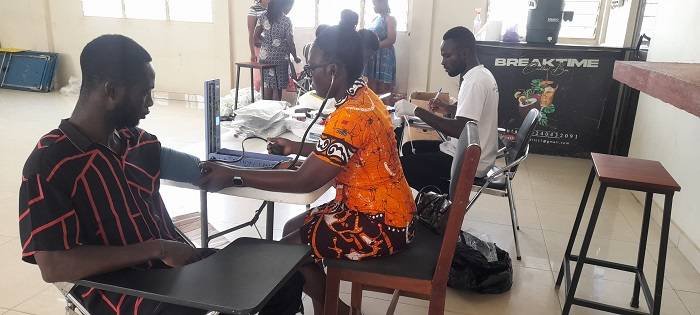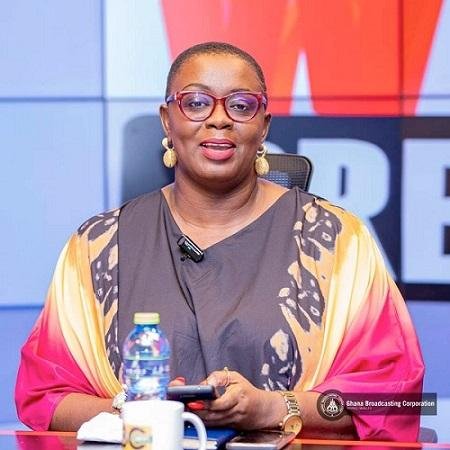Hot!
Blood not for sale at hospitals

A participant undergoing medical screening
The Deputy in-charge of the Laboratory Unit of the St Joseph Hospital in Koforidua, Selina Quashie, has urged the public to ignore speculations that blood was for sale in hospitals in the country.
According to Madam Quarshie,a Medical Laboratory Scientist, such speculations deterred people from donating to the blood banks, hence the blood shortages in the hospitals which has led to the death of many, especially pregnant women and accident victims.
She said what was usually paid by relations or friends of recipients were processing fees, adding that the notion was untrue and appealed to the public, especially corporate institutions to debunk such reports and donate to help save lives in the hospitals.
Madam Quashie made these statements during a blood donation exercise organised by the Koforidua Technical University and the St Joseph Hospital to encourage workers, lecturers and students to donate blood to the hospital in the municipality.
She disclosed that some tribes believed donating blood would cause men to lose their manhood or that the blood were sold to ‘Sakawa’, adding that some parents of students in the second cycle institutions advise their children not to donate because of the notion.
“As we speak, we only have just 10 pints of blood, five positives, ‘O’ positives, three ‘B’ positives and two ‘A’ positives. We don’t have O negatives, so if an emergency happens it will be difficult to save lives,” she said,adding that it was an unfortunate situation.
Madam Quashie said blood was an essential commodity that could not be bought at the market or the pharmacy and stated that there was the need for people to donate to save lives.
She stated that donating blood gave the public the opportunity to know their health status, adding that it was necessary to engage in the exercise to enable a person to know and receive help if necessary.
The Vice Chancellor of the Koforidua Technical University, Professor David Kofi Essumang called on all tertiary institutions in the country to organise blood donation exercises to support the hospital to have enough blood for their operations, adding that the country’s maternal mortality was high due to inadequate blood at the blood banks in hospitals across the country.
“It is unacceptable that women who have gone to deliver or victims of accidents who required blood will die as a result of inadequate blood.
He said the exercise was therefore necessary to enable the university to donate to stock the hospital’s blood bank with enough blood and revealed that management of KTU would organise the exercise annually to support the hospital.
“We make blood available to the hospital facilities so that when we are in need of blood, we will also fall on them to support us,” he said and stated that the universities played a major role in the health delivery system in the country and hence should support.
From Ama Tekyiwaa Ampadu Agyeman, Koforidua
Hot!
Let’s reintroduce Cultural Studies to complement educational reforms — Tourism Minister

Madam Abla Dzifa Gomashie, the Minister of Tourism, Culture and Creative Arts, has emphasised the importance of reintroducing Cultural Studies in schools as part of Ghana’s broader educational reform agenda.
She said Cultural Studies would complement existing efforts to reposition Science, Technology, Engineering and Mathematics (STEM) and Technical Vocational Education and Training (TVET) to promote digital literacy and expand Creative Arts education.
Speaking at the 2025 Homowo Festival of the people of Ningo-Prampram, held on the theme: “Education: The Best Legacy for our Children,” Madam Gomashie said cultural education was critical to national identity and development.
She noted that the festival’s theme aligned with the Government’s vision to transform education in Ghana and encouraged the youth to embrace it not only as a means of personal development but also as a way of preserving traditional values.
These values, including patience, wisdom, and hard work, were at the core of the Homowo celebration, the Minister said.
“Cultural festivals like Homowo are vital instruments for strengthening cultural identity, preserving historical memory, and fostering national unity. Additionally, festivals serve as platforms for educating the youth through storytelling, music, dance, and other traditional practices, while also providing opportunities for community engagement.”
Madam Gomashie highlighted the strong foundation that Ghana’s tourism was built on, which included culture, traditions, and the creative industry, collectively contributing to over GH¢4.8 billion to the economy.
“Festivals give tourists reasons to visit our country. Therefore, with the right infrastructure and the development of all the domains, the sector can do more than what has been recorded,” she added.
Mr Sam Nartey George, the Member of Parliament for Ningo-Prampram and Minister of Communication, Digital Technology and Innovation, commended the community for their vibrant participation in the festival. He announced plans for the construction of a new nursing training school in Ningo, aimed at expanding access to healthcare education in the area.
Nene Osroagbo Djangmah XII, Paramount Chief of Great Ningo Traditional Area; King Dr Tackie Teiko Tsuru II, Ga Mantse; Nene Tetteh Wakah III, Paramount Chief of the Prampram Traditional Area; Prof. Odaifio Welentsi III, Paramount Chief of the Nungua Traditional Area; Naana Dugbakuwor Dugba II, Paramount Queen Mother of Great Ningo; and Mr. Elvis Afriyie Ankrah, Special Envoy on Religion and Inter-Faith Affairs, who represented the Chief of Staff, were among dignitaries at the festival. -GNA
Hot!
Focus on more pressing issues like Galamsey, not hate speech – Ellen Ama Daaku to Mahama

An aide to former Vice President Dr. Mahamudu Bawumia,Ellen Ama Daaku has advised President John Dramani Mahama to shift his attention from social media hate speech to more urgent national issues such as illegal mining.
Speaking in an interview, she noted that the President’s recent comments about tracking the IP addresses of people who spread hate speech were unnecessary.
According to her, President Mahama must first define what he considers to be hate speech before seeking to punish people for it.
Ms. Daaku argued that the President himself had benefitted from hate speech and social media attacks in the past when he was in opposition.
She said even during his time in government, he described his opponents and their tribesmen in unpalatable terms, which later drew complaints from former President Nana Akufo-Addo to the Catholic Bishops’ Conference.
She stressed that harsh criticism of leaders on social media should not automatically be considered hate speech, adding that former leaders, including former President Nana Akufo-Addo had all been subjected to it.
“He is only feeling what Nana Akufo-Addo went through for eight years,” she remarked.
While acknowledging the need to regulate misconduct online, Ms. Daaku insisted that going after social media activists should not be a priority.
She noted that many political activists, including herself, had been insulted and attacked online but never called for arrests.
She concluded that President Mahama should focus his energy on solving pressing problems such as galamsey and the economy instead of concentrating on critics on social media.
By: Jacob Aggrey






